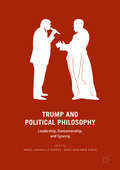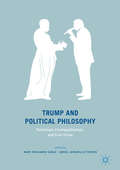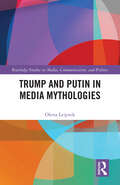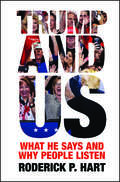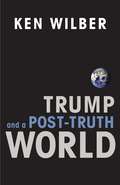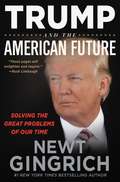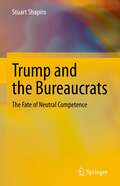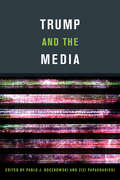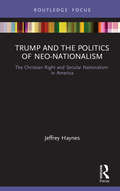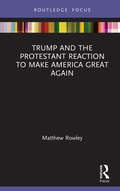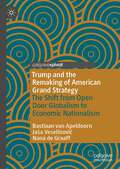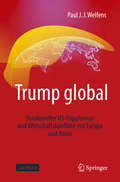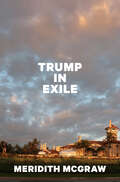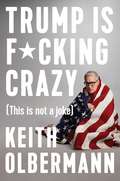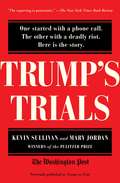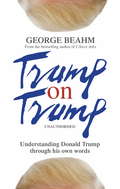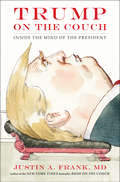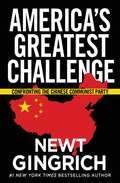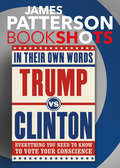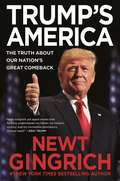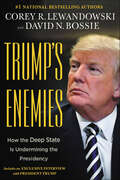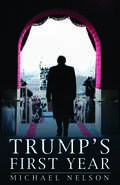- Table View
- List View
Trump and Political Philosophy: Leadership, Statesmanship, and Tyranny
by Marc Benjamin Sable Angel Jaramillo TorresThis book aims to recover from ancient and modern thinkers valuable arguments about statesmanship, leadership, and tyranny which illuminate reassessments of political science and practice after the election of Donald Trump. Like almost everyone else, contemporary political scientists were blind-sided by the rise of Trump. No one expected a candidate to win who repeatedly violated both political norms and the conventional wisdom about campaign best practices. Yet many of the puzzles that Trump’s rise presents have been examined by the great political philosophers of the past. For example, it would come as no surprise to Plato that by its very emphasis on popularity, democracy creates the potential for tyranny via demagoguery. And, perhaps no problem is more alien to empirical political science than asking if statesmanship entails virtue or if so, in what that virtue consists: This is a theme treated by Plato, Aristotle, and Machiavelli, among others. Covering a range of thinkers such as Confucius, Plutarch, Kant, Tocqueville, and Deleuze, the essays in this book then seek to place the rise of Trump and the nature of his political authority within a broader institutional context than is possible for mainstream political science.
Trump and Political Philosophy: Patriotism, Cosmopolitanism, And Civic Virtue
by Marc Benjamin Sable Angel Jaramillo TorresThis book seeks to address the relation of political philosophy and Donald Trump as a political phenomenon through the notions of patriotism, cosmopolitanism, and civic virtue. Political philosophers have been prescient in explaining trends that may explain our political misgivings. Madison warned during the debates on the Constitution that democracies are vulnerable to factions based on passion for personalities and beliefs; various continental thinkers have addressed the problem of nihilism—the modern loss of faith in objective standards of truth and morality—that in Max Weber’s analysis pointed to the importance of charisma, in Carl Schmitt’s to the idea that politics is essentially rooted in the definition of friends and enemies, and in early Heidegger resulted in the emphasis on the enduring significance of local, rather than cosmopolitan values. The former concerns—regarding demagoguery, charisma and nihilism—will enable an evaluation of Trump as a political character, while the latter concerns—regarding the status of universal versus local values—will enable us to evaluate the content of “Trumpism.” Taken together, these essays seek to advance the public conversation about the relationship between the rise of Trump and the ideological forces that seek to justify that rise.
Trump and Putin in Media Mythologies (Routledge Studies in Media, Communication, and Politics)
by Olena LeipnikTrump and Putin in Media Mythologies provides an account of the media portrayal of two presidents—Donald Trump of the United States and Vladimir Putin of the Russian Federation—as mythologized figures.The book delineates the mythologizing strategies media employ to build these two leaders’ narratives and the logic of mythologization of the overall political process. It addresses the construction of the two presidential imageries and the political and cultural needs fulfilled by the archetypes they embody. The volume provides a comparative analysis of two culture-specific narrating strategies that resonate with the two—American and Russian—electorates.This interdisciplinary account combines the areas of media studies, myth studies, political anthropology, and cultural studies. It will also be an essential read for scholars and graduate students interested in political communication, public relations, and cognitive marketing.
Trump and Us: What He Says and Why People Listen (Communication, Society and Politics)
by Roderick P. HartWhy did 62 million Americans vote for Donald Trump? Trump and Us offers a fresh perspective on this question, taking seriously the depth and breadth of Trump's support. An expert in political language, Roderick P. Hart turns to Trump's words, voters' remarks, and media commentary for insight. The book offers the first systematic rhetorical analysis of Trump's 2016 campaign and early presidency, using text analysis and archives of earlier presidential campaigns to uncover deep emotional undercurrents in the country and provide historical comparison. Trump and Us pays close attention to the emotional dimensions of politics, above and beyond cognition and ideology. Hart argues it was not partisanship, policy, or economic factors that landed Trump in the Oval Office but rather how Trump made people feel.
Trump and a Post-Truth World: An Evolutionary Self-correction
by Ken WilberA provocative and balanced examination of our current social and political situation -- by a cutting-edge philosopher of our times.The world is in turmoil. As populist waves roil the Brexit-bound U.K., along with Europe, Turkey, Russia, Asia—and most visibly, the U.S. with the election of Donald Trump—nationalist and extremist political forces threaten the progress made over many decades. Democracies are reeling in the face of nihilism and narcissism. How did we get here? And how, with so much antagonism, cynicism, and discord, can we mend the ruptures in our societies? In this provocative work, philosopher Ken Wilber applies his Integral approach to explain how we arrived where we are and why there is cause for hope. He lays much of the blame on a failure at the progressive, leading edge of society. This leading edge is characterized by the desire to be as just and inclusive as possible, and to it we owe the thrust toward women’s rights, the civil rights movement, the environmental movement, and the concern for oppression in all its forms. This is all evolutionarily healthy; what is unhealthy is a creeping postmodernism that is elitist, “politically correct,” insistent on an egalitarianism that is itself paradoxically hierarchical, and that looks down on “deplorables.” Combine this with the techno-economic demise of many traditional ways of making a living, and you get an explosive mixture. As Wilber says, for some Trump voters: “Everywhere you are told that you are fully equal and deserve immediate and complete empowerment, yet everywhere are denied the means to actually achieve it. You suffocate, you suffer, and you get very, very mad.” It is only when members of society’s leading edge can heal themselves that a new, Integral evolutionary force can emerge to move us beyond the social and political turmoil of our current time to offer genuine leadership toward greater wholeness.
Trump and the American Future: Solving the Great Problems of Our Time
by Newt GingrichIn this insightful call to action, New York Times bestselling author Newt Gingrich explains what is at stake in the 2020 elections -- and why Donald Trump must be re-elected. <P><P>The 2020 election will be a decisive choice for America, especially as we emerge from the coronavirus crisis. Will the American people choose four more years of President Trump to lead us back to strong economic growth, a foreign and trade policy of putting American interests first, dismantling the deep state, and dramatically reforming the bureaucracies? Or will they reject Trumpism and elect the radical Democratic policies of big government, globalism, and socialist policies that Joe Biden represents? <P><P>Not since the election of 1964 has the choice in an election been so stark.Trump and the American Future by Newt Gingrich will lay out the stakes of the 2020 election and provide a clarion call for all Americans on why it is vital to return President Trump to the White House for a second term. Featuring insights gleaned from the lifetime of experience and access only Newt Gingrich can bring, Trump and the American Future will be crucial reading for every citizen who wants to continue to make America great again. <P><P><b> A New York Times Bestseller</b>
Trump and the Bureaucrats: The Fate of Neutral Competence
by Stuart ShapiroThis volume discusses the long term impacts of the Trump presidency on the federal bureaucracy. Drawing on the longstanding academic literature on neutral competence and interviews with the bureaucrats themselves, this book adds insight to the academic question of the role of bureaucrats in a democratic system after a four-year period in which their role has been questioned and threatened as never before. Focusing on the elite agencies of the Office of Management and Budget, the Congressional Budget Office, the Government Accountability Office, as well as the Economic Research Service at the Department of Agriculture, the chapters evaluate individual experiences of members of each agency during the Trump presidency through the lens of the growing tension between politics and administration. Enlightening the role that bureaucrats play in American democracy in an era when polarization is on the rise and disputes over the role of the civil service are growing, this volume will be of interest to scholars and students in public policy, political science, and public administration as well as policymakers and members of the US federal government workforce.
Trump and the Media
by Zizi Papacharissi Pablo BoczkowskiThe election of Donald Trump and the great disruption in the news and social media. Donald Trump's election as the 45th President of the United States came as something of a surprise—to many analysts, journalists, and voters. The New York Times's The Upshot gave Hillary Clinton an 85 percent chance of winning the White House even as the returns began to come in. What happened? And what role did the news and social media play in the election? In Trump and the Media, journalism and technology experts grapple with these questions in a series of short, thought-provoking essays. Considering the disruption of the media landscape, the disconnect between many voters and the established news outlets, the emergence of fake news and “alternative facts,” and Trump's own use of social media, these essays provide a window onto broader transformations in the relationship between information and politics in the twenty-first century. The contributors find historical roots to current events in Cold War notions of "us" versus "them," trace the genealogy of the assault on facts, and chart the collapse of traditional news gatekeepers. They consider such topics as Trump's tweets (diagnosed by one writer as “Twitterosis”) and the constant media exposure given to Trump during the campaign. They propose photojournalists as visual fact checkers (“lessons of the paparazzi”) and debate whether Trump's administration is authoritarian or just authoritarian-like. Finally, they consider future strategies for the news and social media to improve the quality of democratic life. Contributors Mike Ananny, Chris W. Anderson, Rodney Benson, Pablo J. Boczkowski, danah boyd, Robyn Caplan, Michael X. Delli Carpini, Josh Cowls, Susan J. Douglas, Keith N. Hampton, Dave Karpf, Daniel Kreiss, Seth C. Lewis, Zoey Lichtenheld, Andrew L. Mendelson, Gina Neff, Zizi Papacharissi, Katy E. Pearce, Victor Pickard, Sue Robinson, Adrienne Russell, Ralph Schroeder, Michael Schudson, Julia Sonnevend, Keren Tenenboim-Weinblatt, Tina Tucker, Fred Turner, Nikki Usher, Karin Wahl-Jorgensen, Silvio Waisbord, Barbie Zelizer
Trump and the Politics of Neo-Nationalism: The Christian Right and Secular Nationalism in America (Innovations in International Affairs)
by Jeffrey HaynesNo analysis of the Donald Trump phenomenon and American neo-nationalism is satisfactory without examining the impact of both the Christian Right and the secular nationalist right, both in the USA and abroad. This book analyses the political impact of both strands in relation to America’s culture wars at home and the clash of civilisations in the USA’s foreign policy. Each strand – religious and secular – has had different issues to pursue during the Trump presidency: religious liberty and associated issues, on the one hand, and 'America's place in the world', on the other. This book demonstrates how both strands overlap and draw on each other's concerns to exhibit a pronounced, multifaceted neo-nationalism which was ideologically important for the Trump presidency. The author emphasises that the Trump phenomenon has been building for decades, and the Trump presidency has used significant political, social, economic, and cultural disquiet, and the post-2008 economic crisis and associated global turmoil, to fashion and progress policies which appeal strongly to both the Christian Right and many secular nationalists. This book will be of interest to students, researchers, and policy-makers interested in American politics, American political history, religion and politics in America, and religion and IR with a focus on the USA.
Trump and the Protestant Reaction to Make America Great Again: Protestant Reactions to ‘Make America Great Again’ (Routledge Focus on Religion)
by Matthew RowleyThis book explores how polarised interpretations of America’s past influence the present and vice versa. A focus on competing Protestant reactions to President Trump’s ‘Make America Great Again’ slogan evidences a fundamental divide over how America should remember historical racism, sexism and exploitation. Additionally, these Protestants disagree over how the past influences present injustice and equality. The 2020 killing of George Floyd forced these rival histories into the open. Rowley proposes that recovering a complex view of the past, confessing the bad and embracing the good, might help Americans have a shared memory that can bridge polarisation and work to secure justice and equality. An accessible and timely book, this is essential reading for those concerned with the vexed relationship of religion and politics in the United States, including students and scholars in the fields of Protestantism, history, political science, religious studies and sociology.
Trump and the Remaking of American Grand Strategy: The Shift from Open Door Globalism to Economic Nationalism
by Naná de Graaff Bastiaan van Apeldoorn Jaša VeselinovičThis book offers a comprehensive explanatory account of Trump's foreign policy by assessing its nature, determining the extent to which it broke with the policy of preceding presidencies, and explaining how this shift came about. We argue that Trump has succeeded in remaking America’s grand strategy by unmaking its long-standing strategy of what we call Open Door Globalism, a strategy of economic expansionism through the promotion of open markets across the globe and its institutionalization into a US-led liberal world order. Trump has broken with Open Door Globalism in probably lasting ways by adopting an outlook and strategy of neo-mercantilist economic nationalism based upon an ‘America First’ redefinition of US sovereignty and national interests. We explain this Trumpian shift in US foreign policy by focusing on the social sources of Trump’s foreign policy-making elite’s agency, analysing it both in terms of foreign policy-makers’ embeddedness in elite networks and within the changing global and domestic context. The latter, coupled with a crisis of established elite power, also indicates why Biden has not returned to Open Door Globalism but doubled down on some aspects of the Trumpian economic nationalist break.
Trump global: Struktureller US-Populismus und Wirtschaftskonflikte mit Europa und Asien
by Paul J.J. WelfensWas steckt hinter der durch Donald Trump geprägten neuen Wirtschaftspolitik der USA? Ist eine populistische Präsidentschaft in den Vereinigten Staaten ein vorübergehendes Phänomen? Dieses Buch erklärt, warum „Trumpism“ ein strukturelles Problem ist und welche Folgen der US-Protektionismus und die inkonsistente Wirtschaftspolitik für die USA, die Europäische Union und Asien haben werden. Wirtschaftlich zerstört Trump den Multilateralismus und die Arbeit internationaler Organisationen – die USA unter Trump unterstützen den BREXIT und untergraben Integrationsprojekte weltweit. Europäische Länder könnten den USA helfen, Stabilität in einem nicht-populistischen Rahmen wiederherzustellen, indem sie Elemente der erfolgreichen Sozialen Marktwirtschaft exportieren. Schwächen im US-Gesundheitssystem, nicht erst seit der Coronavirus-Krise sichtbar, könnten so überwunden werden.
Trump in Exile
by Meridith McGrawFilled with deep insights and never-before-seen details, Trump in Exile is an explosive, all-access account from behind the scenes at Mar-a-Lago as former president Donald Trump regroups from an election defeat that he refuses to acknowledge and plots his return. The Capitol riots on January 6, 2021, put a horrific closing note on a norm-shattering presidency, as the twice-impeached Donald Trump rode a wave of denial and resentment out of 1600 Pennsylvania Avenue and crashed back at Mar-a-Lago—seemingly wounded, seemingly done. But he wasn&’t. And what, exactly, was he building in there? Meridith McGraw vividly chronicles the incredible period of Trump&’s exile in South Florida—a postpresidency like no other in American history—and brings us inside the gilded walls of his private club, where an alternate reality in which the 2020 election was stolen became Republican Party orthodoxy. How did the country go from Trump&’s political banishment to his renewed dominance over his party, as he effortlessly destroyed the once-formidable Ron DeSantis and now stands on the verge of returning to the White House—all while facing the heavy shadow of multiple federal and state criminal indictments? The Mar-a-Lago period is essential for understanding Trump&’s implausible resurgence and the many missed opportunities to stop him. From a reporter who has covered the Trump era from its beginning, through the White House years, to his 2024 campaign, Meridith McGraw&’s Trump in Exile is riveting contemporary history, vital to our understanding of this defining American moment.
Trump is F*cking Crazy: (This is Not a Joke)
by Keith OlbermannWitty, acerbic, hard-hitting, and timely, Keith Olbermann's Donald Trump commentaries come adapted from his hit GQ series The Resistance. Since Donald Trump's presidential nomination, Keith Olbermann has emerged as one of the web's most popular anti-Trump screedists—each installment of his GQ web series The Resistance receives nearly four million views, and his fiercely progressive monologues have garnered a new generation of fans and followers. In TRUMP IS F*CKING CRAZY, Olbermann takes our Commander in Chief and his politics apart with journalistic acuity and his classic in-your-face humor. With more than 50 individual essays adapted from his GQ commentaries, including new up-to-the-minute material, TRUMP IS F*CKING CRAZY is essential reading for concerned citizens who—like Olbermann—refuse to normalize or accept our new political reality.
Trump on Trial: The Investigation, Impeachment, Acquittal and Aftermath
by Kevin Sullivan Mary JordanA compelling and masterful account, based on fresh reporting, of the investigation, impeachment, and acquittal of President Donald Trump, a ferocious political drama that challenged American democracy itself.In the spring of 2019, Speaker of the House Nancy Pelosi did not favor pursuing Trump&’s impeachment. Her view was: &“He&’s just not worth it.&” But by September, after a whistleblower complaint suggesting that Trump had used his office for his political benefit, Pelosi decided to risk it. The impeachment inquiry led to charges of abuse of power and obstruction of Congress, a gamble that ultimately meant Trump would be the first impeached president on the ballot in US history. Pulitzer Prize–winning Washington Post reporters Kevin Sullivan and Mary Jordan have crafted a powerful, intimate narrative that concentrates on the characters as well as the dramatic events, braiding them together to provide a remarkable understanding of what happened and why. Drawing on the deep reporting of Post journalists as well as new interviews, Sullivan and Jordan deliver a crisp page-turner with exquisite detail and scenes. They put readers in the room for both sides of the now-famous phone call between Trump and Ukrainian president Volodymyr Zelensky on July 25, 2019, revealing the in-the-moment reactions of those listening to the call in Washington, as well as the tension in Kyiv, as aides passed notes to Zelensky while he was talking to Trump. Sullivan and Jordan deftly illuminate the aims and calculations of key figures. Pelosi&’s evolution from no to yes. Trump&’s mounting fury as &“the I-word&” became inevitable. Senate majority leader Mitch McConnell firmly telling Trump on the phone about the Senate trial: You need to trust me. Trump on Trial teems with unexpected moments. House member Elissa Slotkin, a Michigan Democrat, alone at the National Archives, walking amid the nation&’s founding documents, weighing her vote on impeachment. Fiery Republican congressman Matt Gaetz of Florida, a favorite Trump warrior, deciding to lead the storming of the secure room in the US Capitol basement, where witnesses were testifying. The authors paint vivid portraits of the men and women branded by the president&’s supporters as foes from the &“deep state&”: Ukraine experts Fiona Hill and Lt. Col. Alexander Vindman; ambassadors Marie Yovanovitch and William Taylor. The narrative spools out amid Trump&’s nonstop tweeting and the infinite echo chamber of social media, which amplified both parties&’ messages in ways unknown during past impeachments. Sullivan and Jordan, aided by editor Steve Luxenberg, follow the story into the aftermath of Trump&’s acquittal and the president&’s payback for those whom he believed had betrayed him. The retributions took place as the nation reeled from a devastating pandemic and widespread protests about racial injustice, with another trial looming: the 2020 election.
Trump on Trump
by George BeahmOne thing you cannot deny about Donald Trump is that he speaks his mind... and the results are fascinating!Get to know how that mind works by reading his words. This is an unbiased collection of Trump's most famous and interesting quotes and thus an unofficial guide to his thinking.Brash, outspoken and successful, Donald Trump is a political phenomenon. Some of his more contentious comments have outraged the immigrant community, feminist groups and even the Pope. Whether you like him or loathe him, he's impossible to ignore.Now you can understand more about this most infamous public figure and form your own opinion about the way he thinks. Covering the time since Trump announced that he was running for Republican candidacy, this book looks at excerpts and speeches and puts them into context. Among many topics it covers his views on business, America and other countries; his opinion of himself, women and those who stand, or have stood, against him.This is a fascinating insight into the world's most controversial politician.
Trump on the Couch: Inside the Mind of the President
by Justin A. Frank"A great public service--critical for our time."--Bandy X. Lee, M.D., M.Div., Yale psychiatrist, expert on violence, and editor of The Dangerous Case of Donald TrumpThe New York Times-bestselling author of Bush on the Couch shows that Donald Trump is mentally and emotionally unfit to execute the duties of President.No president in the history of the United States has inspired more alarm and confusion than Donald Trump. As questions and concerns about his decisions, behavior, and qualifications for office have multiplied, they point to one primary question: Does he pose a genuine threat to our country? The American Psychiatric Association's Goldwater Rule constrains psychiatrists from offering diagnoses on public figures who are not patients and who have not endorsed such statements. But in Trump on the Couch Clinical Professor of Psychiatry Justin A Frank invokes the moral responsibility that compels him to speak out and present a full portrait of a man who presents us with a clear and present danger.Using observations gained from a close study of Trump's patterns of thought, action, and communication, Dr. Frank uncovers a personality riddled with mental health issues. His analysis is filled with important revelations about our nation's leader, including disturbing insights into his childhood, his family, his business dealings, and his unusual relationship with alternative facts, including how * The absence of a strong maternal force during childhood has led to Trump's remarkable lack of empathy and disregard for women's boundaries; * His compulsion to polarize America has grown out of the way he perceives the world as full of deceitful and destructive persecutors; * His inability to tolerate the pain of frustration has triggered his belief that omnipotence will finally remove it; * His idiosyncratic use of language points to larger issues than even his tweets might suggest.With our country itself at stake, Dr. Frank calls attention to the underlying narcissism, misogyny, deception, and racism that drive the President who endangers it. A penetrating examination of how we as a nation got here and, more important, where we are going, Trump on the Couch sounds a call to action that we cannot ignore.
Trump to Harvard: Harvard to Trump: Let's Make a Deal!
by Alan DershowitzPresident Donald Trump has declared war against elite American universities, such as Harvard, and has threatened to cut off federal funding, end tax exemptions, and limit foreign student visas. Harvard has filed lawsuits and threatened additional legal action. The nation is deeply divided over this conflict. How should Americans who care deeply about universities, about antisemitism, and about the proper role of government respond to this dangerous rift? Alan Dershowitz poses four basic questions about the decision whether to defund or otherwise punish universities that discriminate against—or apply a double standard to—Jews as victims of discrimination.Is it ever permissible, as a matter of policy and academic freedom, to weaponize governmental funding of universities in an effort to influence their policies?Is it constitutional or otherwise legal to cut off governmental funding based on the content of university speech or policies?Is the Trump administration justified in defunding universities such as Harvard and Columbia for their failures to deal effectively with growing antisemitism on their campuses?Can the government deny student (or faculty) visas to individuals who advocate or promote antisemitism or other actions that violate American policies?Among the reforms Dershowitz advocates are a return to meritocratic admissions and hiring; a return to rigorous blind grading; the end of the non-meritocratic diversity, equity, and inclusion bureaucracies; the application of a single standard of free speech, academic freedom, and discipline; and the end of ethnic, gender, regional, religious, sexual preference, and other identity-based departments, studies, programs, and other advocacy centers that have become incubators for anti-Jewish bigotry.
Trump v Trump
by Orion Publishing GroupCan you tell the Trumpisms from the hot air?!?!The big bad media just keeps on spreading tall tales, but at long last here is a book that can help you hone your skills of fishing the truth from the lies! On each page of this book, you'll find two statements on the same subject matter. One is from the real Trump (i.e. a definitive quote from DJT about happenings in the USA, the rest of the world, people and general wisdom). The other is your average trump (something we made up, fake news, hot air, smoke in the wind, a big fat fart). For example* . . .A) TRUMP: Climate change has happened since dinosaur times, it's happened since cave men walked the earth. And they didn't have cars in the Ice Age.orB) TRUMP: It's really cold outside, they are calling it a major freeze, weeks ahead of normal. Man, we could use a big fat dose of global warming!The perfect stocking filler for quiz-hungry politicos this Christmas, TRUMP V TRUMP will keep you entertained for hours.-----* The Answer is B! Donald tweeted this back on 19 October 2015 - because who isn't wistful for climate change?
Trump v Trump
by Orion Publishing GroupCan you tell the Trumpisms from the hot air?!?!The big bad media just keeps on spreading tall tales, but at long last here is a book that can help you hone your skills of fishing the truth from the lies! On each page of this book, you'll find two statements on the same subject matter. One is from the real Trump (i.e. a definitive quote from DJT about happenings in the USA, the rest of the world, people and general wisdom). The other is your average trump (something we made up, fake news, hot air, smoke in the wind, a big fat fart). For example* . . .A) TRUMP: Climate change has happened since dinosaur times, it's happened since cave men walked the earth. And they didn't have cars in the Ice Age.orB) TRUMP: It's really cold outside, they are calling it a major freeze, weeks ahead of normal. Man, we could use a big fat dose of global warming!The perfect stocking filler for quiz-hungry politicos this Christmas, TRUMP V TRUMP will keep you entertained for hours.-----* The Answer is B! Donald tweeted this back on 19 October 2015 - because who isn't wistful for climate change?
Trump vs. China: Facing America's Greatest Threat
by Newt GingrichFormer Speaker of the House Newt Gingrich sounds the warning bell that communist-ruled China poses the biggest threat to the United States that we have seen in our lifetime. <P><P>The United States is currently engaged in a competition with the Chinese government unlike any other that we have witnessed before. This is a competition between the American system-which is governed by freedom and the rule of law-and a totalitarian dictatorship that is controlled by the Chinese Communist Party. These are two different visions for the future; one will succeed, and one will fail.It is possible for America to respond to the Chinese Communist Party's efforts, but doing so will require new thinking, many big changes, and many hard choices for our leaders in government and private sector. <P><P>Newt Gingrich's Trump vs. China: Facing America's Greatest Threat will serve as a rallying cry for the American people and a plan of action for our leaders in government and the private sector. Written in a language that every American can understand but still rich in detail and accurate in fact, Trump vs. China will expose the Chinese Communist Party's multi-pronged threat against the United States and what we must do as a country to survive. <P><b>A New York Times Bestseller</b>
Trump vs. Clinton: Everything You Need to Know to Vote Your Conscience
by James Patterson Denise Roy"Our commander in chief has to be able to defend our country, not embarrass it."*-Hillary Clinton "She doesn't have strength. She doesn't have the stamina. . . . I think she's an embarrassment."**-Donald TrumpIn this presidential contest of diametric opposites, nothing is certain on the path to the polls-except that every word matters. Direct from the candidates, from point and counterpoint to wit and wisdom, an unvarnished conversation on the issues captivating the American electorate. *Victory speech on Super Tuesday II, West Palm Beach, Florida, March 15, 2016**Interview on CNN, New Day, March 16, 2016BookShotsLIGHTNING-FAST READS BY JAMES PATTERSONBooks you can devour in a few hoursImpossible to stop listeningAll original content by James Patterson
Trump's America: The Truth about Our Nation's Great Comeback
by Newt GingrichNo one understands the "Make America Great Again" effort with more insight and more experience than former Speaker of the House Newt Gingrich. <P><P>Gingrich helped President Ronald Reagan "Make America Great Again" in 1980. He authored the Contract with America and spearheaded the 1994 Republican Revolution that brought the House of Representatives under Republican control after 40 years. He knows what it is like to fight the Washington swamp and challenge the establishment - he has done it his entire career. <P><P>Now, the author of the #1 New York Times bestseller Understanding Trump is back to illustrate how our nation's 45th President is leading our country's great comeback. From the fight of over the Southern Border Wall, to the Republican tax cuts, to the swamp's unending efforts to undermine and oppose the President, Trump's America lays out the truth about the Trump presidency - the truth the mainstream media won't tell you.In this book, Gingrich - who has been called the President's chief explainer - presents a clear picture of this historic presidency and the tremendous, positive impact it is having on our nation and the world. <P>Gingrich unmasks the various branches of the anti-Trump coalition that are trying to stop America's great comeback. He reveals the flaws in their ideological assaults on the President and offers a battle plan for those in Trump's America to help the President defeat these attacks. <P>Throughout Trump's America, Gingrich distills decades of experience fighting Washington with a lifetime of studying history to help every American understand how we can all keep working to make America great. <P><b>A New York Times Bestseller</b>
Trump's Enemies: How the Deep State Is Undermining the Presidency
by Corey R. Lewandowski David N. BossieCorey R. Lewandowski and David N. Bossie, the authors of the blockbuster, Let Trump Be Trump: the Inside Story of His Rise to the Presidency, are back with their next New York Times bestseller. The assault on the 45th president began immediately following Donald J. Trump's victory in the 2016 presidential election. It was then that Democrats concocted the absurd story of Russian spies and international plots as an excuse for Hillary's humiliating defeat. It was in those early days, too, during the presidential transition, when enemies of Donald Trump began to tunnel their way into the White House with the intent to undermine the president and subvert his agenda. Perhaps there are no two people better to tell what is certain to be the story of our lifetime than Corey R. Lewandowski and David N. Bossie. The guys in the room who brought you the bestselling account of the 2016 Donald J. Trump for President campaign, Let Trump Be Trump, Lewandowski and Bossie now offer a first-hand account of what is, perhaps, the battle for the life of our very democracy. Using unparalleled, behind-the-scenes sourcing from inside the White House and on Capitol Hill, and access to the president and other key players, Trump's Enemies offers a never-before-seen look deep into the forces aligned against the president. Lewandowski and Bossie were present in Trump Tower and at Bedminster during the presidential transition and saw the events that gave root to the unelected "resistance" in the White House today. Bossie was witness to the moment the fake Russia investigation was enacted by James Comey, who legitimized the phony "Steele dossier" by presenting it to the new president-elect. A close confidant of the president, Lewandowski knows what goes on behind the West Wing walls as well as anyone. But Trump's Enemies is also the story of how President Trump is fighting back. In the face of a gale of media disinformation and the looming black cloud of Mueller's politically motivated investigation, President Trump has still managed to accomplish more than any of his predecessor in the short time he's been in office. Often traveling with the president on Air Force One to rallies around the country, Lewandowski and Bossie tell, as no one else can, the story of Donald Trump bringing his message to the people who are the only ones who should decide the future of his presidency-the American voters.
Trump's First Year (Miller Center Studies on the Presidency)
by Michael NelsonDonald Trump took office in January 2017 under mostly favorable conditions. He inherited neither a war nor an economic depression, and his party controlled both houses of Congress. He leveraged this successfully in some ways by delivering on his campaign promises to roll back regulations on business, and he saw his nominee for the Supreme Court, Neil Gorsuch, approved swiftly and with little controversy. Many more actions, however, have been perceived as failures or even threats to a safe, functional democracy, from immigration policies defied by state and local governments and volatile dealings with North Korea to unsuccessful attempts to pass major legislation and the inability to fill government positions or maintain consistent White House staff. In Trump’s First Year, Michael Nelson, one of our finest and most objective presidential scholars, provides a thorough account and scholarly assessment of Donald Trump’s first year as president, starting with his election and transition in 2016. The analysis is grounded in the modern history of the presidency as well as in the larger constitutional and political order. Nelson considers the dramatic election itself, the forming and reforming of the administration, congressional relations, executive actions, bureaucratic politics, judicial appointments and decisions, media relations and public communications, and public opinion. Published on the first anniversary of Trump’s inauguration, Nelson’s book offers the most complete and up-to-date assessment of this still-unfolding story. Miller Center Studies on the Presidency
